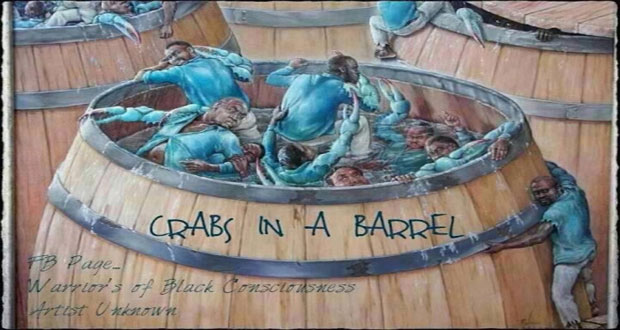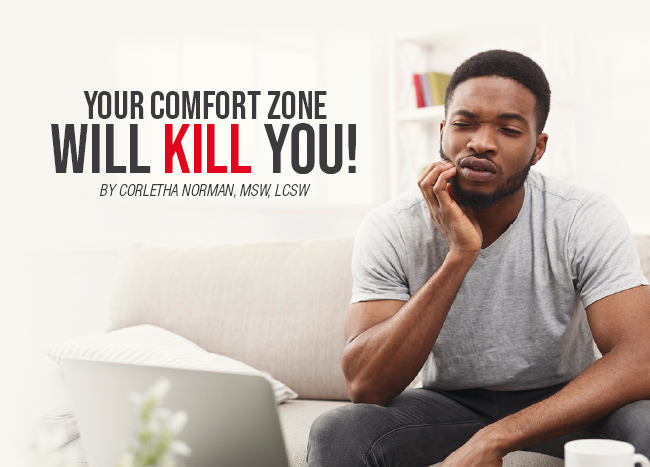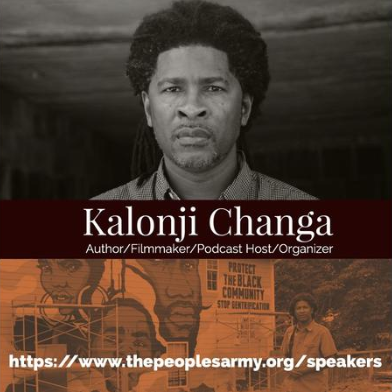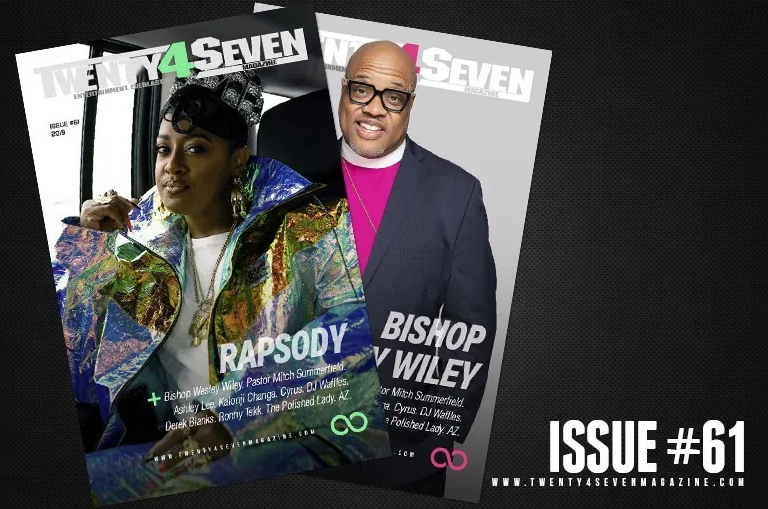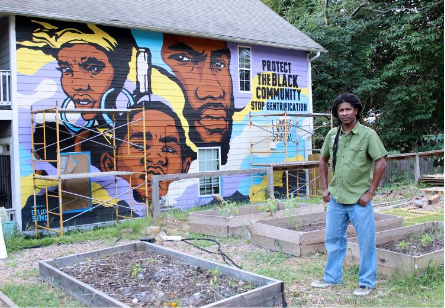
Kalonji Changa: The Community’s Movement Builder
Kalonji Changa is a “black man first and foremost,” that is putting forth action to create revolutionary movement in his community. Read on to find out about programs in your local area and how you can become involved.
Corletha: Kalonji Changa. Tell us a little bit about yourself who you are, what you’re known for, all those sorts of things.
Kalonji: I’m a black man first and foremost; author, filmmaker, podcast host. I’m most known for being a community activist and organizer. I’m from Bridgeport Connecticut. I’ve been in Atlanta for fifteen years and been working ever since.
Corletha: Before we get into a little bit more about what it is that you do, tell us a little bit about growing up in Bridgeport? What was that like?
Kalonji: Yes, Bridgeport Connecticut is a small dark space. I grew up in the hood. I grew up in the south end of Bridgeport; which was at that point a community full of different projects, apartment complexes, so on and so forth. Connecticut, Bridgeport where I’m from, is 45 minutes away from Harlem. You know another 35 minutes away from the Bronx. The same TV, same radio, same crime, you know inner-city. Like most inner cities that has its challenges, you know the difficult environment for what it was. It is a place where I grit my teeth. It’s a place where you have to fight to get out of.
Corletha: Did you find yourself mixed up in the violence at all growing up?
Kalonji: Yeah absolutely. I grew up in the eighties. So, I grew up during Reaganomics and the whole crack era. I was the “white sheep” of the family you know what I mean? If my pop said go left, I would go right. If he said “do this”, I was doing the opposite. Basically, I fell into a trap like many folks during that era and ended up an entrepreneur dealing in the “pharmaceuticals business”. You know what I mean; the unlicensed pharmaceutical business. That took me on a journey that almost cost me– it cost me a little of my freedom, but it almost cost me 36 years of my life.
Corletha: Wow.
Kalonji: I found myself in a jam at age 17 in the state of South Carolina. For the first time I began to understand what my mother, my father, my elders, and some others were speaking on when they were talking about racism, white supremacy and slavery. All that good stuff. I understood at that particular point it was almost like that Malcolm moment. I began to understand what America was truly about and that America was a euphemism for prison. I definitely came up in that era. I wouldn’t say I was proud of it, but I say that it was one of my greatest life lessons.
Corletha: Would you say that it was absolutely life-changing for you? Did it take you from one path to another?
Kalonji: Absolutely. I think that at that particular moment I began to see life for what it’s worth. I began to understand freedom and captivity; and how I and others played into the game of being entrapped and shuffled into this capitalist system. It was absolutely the greatest learning experience. Again, I can say I regret selling plantation poison being on the wrong side of history. At the time when that whole drug game was in full throttle, we didn’t know that we were actually destroying our people trying to build ourselves up. You know what I mean? So, it was kind of like Omali Yeshitela’s piece on Dead Prez’s first album when he talked about how hunters hunted wolves in some indigenous cultures. Hunters would put blood on the blade and the wolf would smell the blood and would lick the blade thinking they had a meal but really slitting his own tongue killing himself. That’s what we were doing. We were by products of our own demise. Again, I don’t regret the experience of being locked up because I can speak on it and understand what value we have there.
Corletha: Would it be fair to say that that experience kind of lit the fire as an activist in you?
Kalonji: Absolutely. The funny thing is, I actually had a stent in activism prior to it, but I was so rebellious. Oftentimes when you’re younger, you’re not really trying to hear what your parents have to say. I was kind of rebellious towards being a part of any type of cause. It absolutely lit the fire. I had these country white boys, who had no problem calling me nigga and all these other derogatory terms, and how the whole workforce was. I was working inside the prison. I was receiving about three dollars and forty something cents every two weeks. I understood what slave labor was about. I saw and I witnessed what capitalism was because you had so many companies that were outsourcing to the prisons. So, you had folks like Victoria’s Secret or Apple, who will outsource to the prison. These inmates who are held captive; they’re good enough to work inside of the camps, but they can’t get a job with these same companies when they get out. So it’s a contradiction. It absolutely lit the fire and I think that was my greatest experience. A lot of things I would go back and change, but that experience was necessary.
Corletha: So, paint a picture for me. What was the very first major circumstance or situation that you organized around?
Kalonji: That I organized, myself as an adult? That would depend on what would be considered major would it be major you know as far as the world knowing about a particular case or?
Corletha: Major to you.
Kalonji: I don’t know if I’d say major, but I say important. I think one of the most important cases for me was probably in 2006, with the police murder of 92-year-old Kathryn Johnston; who was gunned down within a couple miles of where we sit now. That’s a very important case because of the fact that folks in Atlanta had the opportunity to see and relate. Back in the day it was all about you had to be “doing something”. “The police ain’t just going to shoot you.” “What were you doing?” That was the whole thing before social media; before anybody had a cell phone it was blame the victim. So, here is this 92-year-old woman, who never had a traffic ticket, who was murdered inside her own home by police. Then they planted marijuana in the basement. They handcuffed her after they gunned her down. So she’s dead; leaking, bleeding and she’s lying in handcuffs. Across the news they talk about this violent woman, this rogue individual who fired shots at police officers. They didn’t mention the fact that they ripped her burglar bars off her door and came in unannounced with hoodies and Tim boots on. No sign of being police. You’re in the middle of the hood. That was one of the most important cases. I think from there it would be the Troy Davis situation. The Kathryn Johnston case was kind of knocked out because four days later, you had a situation with Sean Bell of New York. He was a groom about to be married who at his…
Corletha: Bachelor party…
Kalonji: Bachelor party yeah! This happened like four days prior. That was swept under the rug because the focus was on this poor groom. Rightfully so but the 92 year old, many folks hadn’t heard anything about that. Like I said, the Troy Davis situation with the brother down in Savannah. He was accused of murdering a police officer and sentenced to death despite overwhelming evidence that he wasn’t even the shooter; and a lack of evidence on the state’s behalf. Nothing to put him at the scene and say he did it. I know you asked for one but I think those were two cases that I worked directly on that I think were the most important.
Corletha: So from my recollection, your work with those particular cases has been documented; most recently in your recently released documentary “Organizing is the new cool.” Can you tell us a little bit about the film itself?
Kalonji: Okay Organizing is the New Cool is a film that we started working on 13 years ago. We began taping to document the community efforts of our organization (The FTP Movement). We wanted to give an example of some of the community activity; some of the programs that exist. We often hear our people talk about what needs to be done. “Black folks need to do this. Black folks need to do that,” as if they themselves are exempt; like “I’m not black. I’m thinking about what you niggas need to do” you know what I mean? Not only did we document our work and efforts, we also highlighted many of the efforts of OG’s and elders who existed before us. You know there’s so many different brothers and sisters who put in the work. We hear about the Malcolm’s. We hear about the Martin’s. There’s never been a man or woman in history who didn’t have a team. You can say Martin he had the SCLC. Malcolm had Muslim Mosque Incorporated as well as The Organization of Afro-American Unity.
So, he had a couple different brothers and sisters who worked directly with him in organizing those particular organizations or entities. Aside from that, you had founders of the Black Panther Party. You have founders of the Black Liberation Army as well as founders of the Revolutionary Action Movement who are still around. I don’t want to give away the film, but we have a number of different activists, hip-hop artists and some who transitioned since our tapings and interviews who aren’t here with us now. So, we wanted to show the world some of their efforts and work. Again, like I said it’s the behind the scene workers who usually put in the grunt work. It’s like a brother pulling up in a Cadillac. Cadillac’s beautiful but the engine, the oil; what’s under the hood that made it possible for that Cadillac to cruise. Without the guts it’s just a shell.”
Corletha: Exactly.
Kalonji: That’s what happens with our organization, that’s the importance we want to highlight. The brothers, sisters and comrades whose names are unknown. Those who don’t get that recognition, because they’re the most important parts of it. That’s kind of what organizing and recruiting is about.
Corletha: Speaking about behind the scenes, you have a long list of different organizations that you have created or are a part of. Can you tell us what all is going on within the complete list of organizations that you’re a part of?
Kalonji: I spoke about the FTP Movement. That was the organization that started back in 2004. Over the years we have united with a number of different organizations; we pretty much merged with organizations like the African Martial Arts Institute, the Black August Organizing Committee and more. We recently formed what we call “the Siafu Movement”. The Siafu Movement is an extension. Siafu is a blind ant out of Kenya (East Africa) that grows to be about an inch. It’s known for stripping down water buffalos, ripping things apart but they are also known for building. You can’t stand in a patch of these ants. I got the idea watching the Discovery Channel. A frog hopped into a patch of Siafus and within 15 minutes there was no evidence that the frog existed minus some bones or whatever. They ate him up literally. We know that the ant is one of the most important and one of the most overlooked creatures on the planet. No one cares about an ant. You want to be a panther, lion or a tiger. Even a gorilla, you know? Who wants to be an ant? An ant is humble. We came up with the Siafu Movement.

Kalonji Changa in front of the “Stop Gentrification” mural on the side of the Community Movement Builders location, in the Pittsburgh neighborhood of the West End of Atlanta Georgia.
We have Community Movement Builders, which is our nonprofit wing. We have Mama’s Army, FTP Movement, the African Martial Arts Institute. We have the National Coalition to Combat Against Terrorism. We have Freedom Home Academy, which is an educational component. We have Siafu Youth Corps, which is an African boy and girl scouts program. We have Urban Survival Preparedness Institute and a number of other different components that make up this one movement. We call it a movement because of the fact that the pieces are active. A lot of times it is fashionable to hear folks talk about “get down with my movement”. It’s like one person and they don’t have anything going on. With us, these are very creative sisters and brothers who are dedicated and committed to our advancement. You have anything from artists to doctors and attorneys. Not just a group of angry militants. Oftentimes they want to just paint you up as Robert Williams talked about as, “These niggas with guns.” I mean they just want to… whenever you talk about independence, whenever you talk about being a strong African, you talk about being against a system of oppression, you’re looked at as just some type of wild militant and a crazy man ‘Oh they’re just angry.’ We’re not angry. We are upset and there’s a difference. We’re upset at where we are. We are upset with how we’ve been treated and disregarded. So, instead of us sitting back and just making some slick posts online, we get active. We come together like ants in a colony. We form this formation and we build and we grow together.
Che Guevara the revolutionary said, “Revolution is an act of love.” When you think of revolution, you can’t point out a revolution which is not about love even if your enemy is attacking you. It is the love for people that would cause you to resist. Harriet Tubman was a revolutionary. She was an abolitionist. She wasn’t just some old lady that was walking folks through some underground tunnels. She was a freedom fighter and she had a gun. She didn’t just come with her tambourine. She didn’t just come with a church fan. I mean that’s not to knock anything. You know Jesus when you talk about the concept of Jesus Christ, he was a revolutionary. He fought against the government of his day. Pontius Pilate was like the Trump of his day. The Roman soldiers were the police of his day. He was a victim of police terrorism because he was lynched. He was hung on a cross. Understand what I’m saying? That was the execution. He was the Troy Davis of his time and he was guilty of being a freedom fighter. He was guilty of feeding the poor you know? He came with the fish and the loaves of bread and he healed the blind. He ran the money changers out of the temple. That’s a revolutionary.
Like Frederick Douglass said, “we want the storms without rain, without the lightning.” This is what comes with war. Anybody who stands up, who dares to stand up against oppression in America is deemed some type of terrorist or outlaw.
They had to get rid of them and that’s pretty much what they’ve been attempting to do for so many years. You know Marcus Garvey, when he was locked up in Atlanta Federal Penitentiary, a reporter rolled up laughing and mocking him. The reporter said, “Mr. Garvey they got you. What you gonna do now?” Garvey said, “You may have the lion in the cage but I left many cubs in the bush.” We are those cubs in the bush and we are grown now. We pay homage to those who came before us who were bold enough and brave enough to fight slavery; to resist. Our job here is not just to brag about how many pyramids we built and all this other nonsense. We know damn well “we” didn’t lift one brick, but “we” built pyramids. Okay cool. Our job is to continue that work and that’s what we doing.
Corletha: I understand. With all this work that you’ve done, all the individuals that you have come across over the years, what role have you seen mental health played in the lives of just the black community overall?
Kalonji: I think that mental health is of paramount importance. In the black community we need healing more than anyone else because we experience all types of trauma. We’ve experienced post-traumatic slave disorder. I read a report about a woman who was talking about the Jewish folks during the Holocaust; how many of their offspring were suffering different traumas. We already know what that’s like. We are suffering from post-traumatic slave disorder from our experience. We still have that in our DNA. The pain, the hurt, the lack of love and the disregard; all of that is embedded within our DNA and in our melanin. It’s just like America. Violence is embedded inside of the fibers of America. This trauma is embedded within us just like our mother. So, I think that it’s important; but unfortunately, we’ve been taught that when you go seek help it’s looked at as a sign of weakness.
Corletha: Yes, it is.
Kalonji: Folks are embarrassed. We’re so damaged and Americanized that we laugh when our people are in pain. We see somebody get shot on TV, and are entertained. You see somebody walking down the street talking to themselves, “oh that fool crazy jumbling down the street”. Someone who is a victim of chemical biological warfare, quote unquote crackhead or dope fiend, we laughing because they trying to sell a broken TV or something like that. In a sense, they’re victims you know? So, I think that it this is very important for us all to seek some type of therapy.
A friend of mine Ekundayo, he’s a rap artist out here. He had a song and in the song, he said, “The world is sick we need therapy.” We all need therapy. If you’re not getting therapy, some type of therapy, then to a great extent you’re a detriment.
Corletha: At this point, what else can we look out for? What else is coming next?
Kalonji: What else can you look out for? Revolution! [laughs] I think that you can look for us to continue to purchase land, continue to grow food, continue to build black families, continue to build institutions, educate ourselves. We’re about nation building. The term nation building is one of those terms that has been thrown around so loosely. We don’t have time for empty rhetoric. Our thing is being proactive, showing proof as they say. So, what you can look out for is some intelligent Afrikans who are building and striving. Whether it’s on local politics, because we’re running brothers and sisters for office on a local level. We don’t believe in electoral politics but if we had our sister sitting on a City Council board, we can make that phone call and cut thru the red tape. So, all of the things I mentioned is what we talk about when we say black power. But many of our people don’t understand power. That’s what we are building.
Corletha: Okay. There is something going on in October I believe with Harriet Tubman?
Kalonji: Yes. We spoke about Harriet Tubman. Harriet Tubman is underrated just like most black women. She’s a freedom fighter. Folks talk about Assata. They talk about Angela Davis. Indeed those are great sister warriors, but they don’t have nothing on Harriet Tubman.
Corletha: I completely agree.
Kalonji: Here in Atlanta we have the King Festival. It’s a big thing. You have the Malcolm X festival and it is huge; but there’s nothing that represents black women. So, we have the Harriet Tubman festival and Harriet Tubman block party. We call it a block party and a few people like “I don’t know if you should call Harriet Tubman’s name with a block party.” We have to get out of our little cubbyholes. A lot of times, folks talk about we preaching to the choir, but sometimes the choir don’t even know the hymn, let alone the sermon. So, you crooning and don’t know the sermon [laughs]. So, instead of us just making a joyful noise, we want to make sure that we’re proactive.
Often times these brothers, we’re the voice. Sometimes we need to shut up. But we’re usually the voices. Any intelligent people know that there’s some sisters behind us that’s helping us to push that thing along. Unfortunately most of the sisters aren’t in the forefront. In this particular piece, I think that probably about 95% of the speakers, teachers and folks who are helping put it together are women. The whole block party concept, that particular piece is to draw other people. We want to draw the neighbors. We as a community, always do these events in neighborhoods where we never invite the neighbors. How crazy is that? We got other stuff going on and neighbors all around us. They don’t know what’s going on? We want to really draw the masses.
Corletha: Right. So, any last words, any words encouragement or anything in particular that you would like to leave our reader’s with?
Kalonji: Yes. You have to get prepared. We’re in a crisis. You know white supremacy is at an all-time high. We’ve been at war for 400 years. We’ve been victims of white supremacy. We’ve been victims of mass murders and mass shootings and all that for 400 years. So, we are hip to that, but we have to prepare ourselves. Learn how to grow food. I’m not going to say get “unified” because that’s such a loose word. Everybody is saying, “We need to stick together.” You be sticking together in the cemeteries, you sticking together in the clubs, you’re sticking together in a jail cell. So, it’s more than us just “sticking together”. We have to join an organization. If you’re not a part of some type of organization; I don’t care what you want to call it, I don’t care who the leader is none of that type of stuff. That’s your own personal business but you have to at least be a part of something that you can purchase food together. If you can’t do nothing but buy toilet paper together. Everybody got to wipe their tail. Can you support black folks that support you? Not just buy black but buy black from folks who are supporting black. Survival preparedness which includes martial arts, firearm training etc. We’re in the south. Gun laws are lax. Go to the range. Instead of taking a girl to the club, take her to the range. Teach her how to shoot or teach your man how to shoot in some cases. So, it’s about those things. We got to get the finances up. We’ve been taught to be poor righteous teachers for so long and taught about how we in “the struggle”. I’m not interested in struggling.
Corletha: I absolutely agree with that.
Kalonji: It’s about our people’s liberation.
Corletha: If anybody wanted to follow up on your works or check out what’s coming up next how can I get in contact with you?
Kalonji: Folks could follow me on Instagram @Whohetalkingto and on Twitter @KalonjiChanga We also have a few different websites. We have the www.Siafumovement.org. We have our film www.organizingisthenewcool.com. We have our podcast which is www.Renegadeculture.org Those are the main ways points of contact.
Corletha: All right and one last question. Organizing is the New Cool where will you all be showing the film next?
Kalonji: Okay right now we are gearing up for film festivals. We’re doing our screenings and film festivals. We don’t just want to put out a DVD to just end up on a table. A lot of times you get the conscious DVDs that are only sold in the conscious spots. We want to reach further because our work goes big. It goes further than just the “conscious community”. In fact, most of our constituents and folks that we serve have absolutely nothing to do with the conscious community. In fact, our membership, brothers and sisters who got down with the work we did or do is made up of everyday brothers and sisters who just wanted to do something. They were understood that folks were hungry are homeless so they got down with the Feed the People program. of just complaining and saying, “that’s a shame” they decided to help make sandwiches and hot meals. “Police are beating up youth in my neighborhood, what do I got to do to put together a community patrol?” You know what I mean? There’s something for everybody besides us just talking tough and selling wolf tickets.
Corletha: I definitely would like to thank you for coming on for an interview and I wish you the best.
Kalonji: Thank you and I appreciate you and this fine publication for having the wherewithal to reach regular folks and everyday people.
No Comments
Leave a reply
You must be logged in to post a comment.

